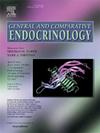Aldosterone increased by chronic unpredictable mild stress damages epididymal sperm quality in young rats
IF 1.7
3区 医学
Q3 ENDOCRINOLOGY & METABOLISM
引用次数: 0
Abstract
In young rats, aldosterone concentration increases in response to stress. Aldosterone can decrease testosterone production. We hypothesized that aldosterone impairs sperm quality, and that this impairment is reversible with 50 mg/kg of eplerenone in young rats. Forty-two young male Wistar rats (51 days old) were divided into six groups: Control, Control + vehicle (C + Veh), chronic unpredictable mild stress (CUMS), and CUMS + eplerenone at three concentrations: 25, 50, and 100 mg/kg bw, a selective aldosterone blocker (CUMS + EP) (n = 7 per each). On postnatal day 51, eplerenone was administered orally via gastric tube 2 h before the start of the stress test. The CUMS paradigm was administered once daily at various times, without repeating the stressor, over a four-week period. We evaluated the effects of chronic stress on serum testosterone concentrations, oxidative stress, apoptosis, and sperm quality. The CUMS group exhibited low testosterone levels and poor epididymal sperm quality. Compared to the CUMS group, the 50 mg/kg dose of eplerenone demonstrated significant improvements in sperm motility (28.8 %), sperm viability (36.9 %), and sperm concentration (58.9 %). In the CUMS context, the 100 mg/kg dose was toxic because it induced oxidative stress and apoptosis. Aldosterone negatively affects epididymal sperm quality by reducing testosterone-induced sperm motility, viability, and concentration. Aldosterone impairs sperm quality, which is reversible with 50 mg/kg of eplerenone. The prevention by eplerenone supports our hypothesis.

慢性不可预测的轻度应激引起的醛固酮升高损害幼鼠附睾精子质量。
在幼鼠中,醛固酮浓度在应激反应中增加。醛固酮可以减少睾酮的产生。我们假设醛固酮会损害精子质量,并且这种损害在年轻大鼠中50 mg/kg的eplerenone是可逆的。将42只51 日龄的年轻雄性Wistar大鼠分为6组,分别为Control、Control + vehicle (C + Veh)、chronic unpredictable mild stress (CUMS)和CUMS + eplerenone(25、50和100 mg/kg bw三种浓度),选择性醛固酮阻断剂(CUMS + EP) (n = 7只)。出生后第51天,在压力测试开始前通过胃管2 h口服依普利酮。在四周的时间里,每天在不同时间进行一次CUMS范式,不重复压力源。我们评估了慢性应激对血清睾酮浓度、氧化应激、细胞凋亡和精子质量的影响。CUMS组睾酮水平低,附睾精子质量差。与CUMS组相比,50 mg/kg剂量的eplerenone显着改善了精子活力(28.8% %),精子活力(36.9% %)和精子浓度(58.9% %)。在CUMS环境中,100 mg/kg剂量是有毒的,因为它诱导氧化应激和细胞凋亡。醛固酮通过降低睾酮诱导的精子活力、活力和浓度,对附睾精子质量产生负面影响。醛固酮会损害精子质量,但服用50 毫克/公斤的依普利酮即可逆转。每个人的预防都支持了我们的假设。
本文章由计算机程序翻译,如有差异,请以英文原文为准。
求助全文
约1分钟内获得全文
求助全文
来源期刊

General and comparative endocrinology
医学-内分泌学与代谢
CiteScore
5.60
自引率
7.40%
发文量
120
审稿时长
2 months
期刊介绍:
General and Comparative Endocrinology publishes articles concerned with the many complexities of vertebrate and invertebrate endocrine systems at the sub-molecular, molecular, cellular and organismal levels of analysis.
 求助内容:
求助内容: 应助结果提醒方式:
应助结果提醒方式:


